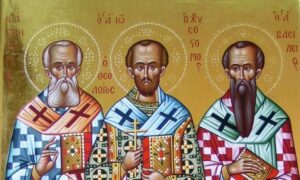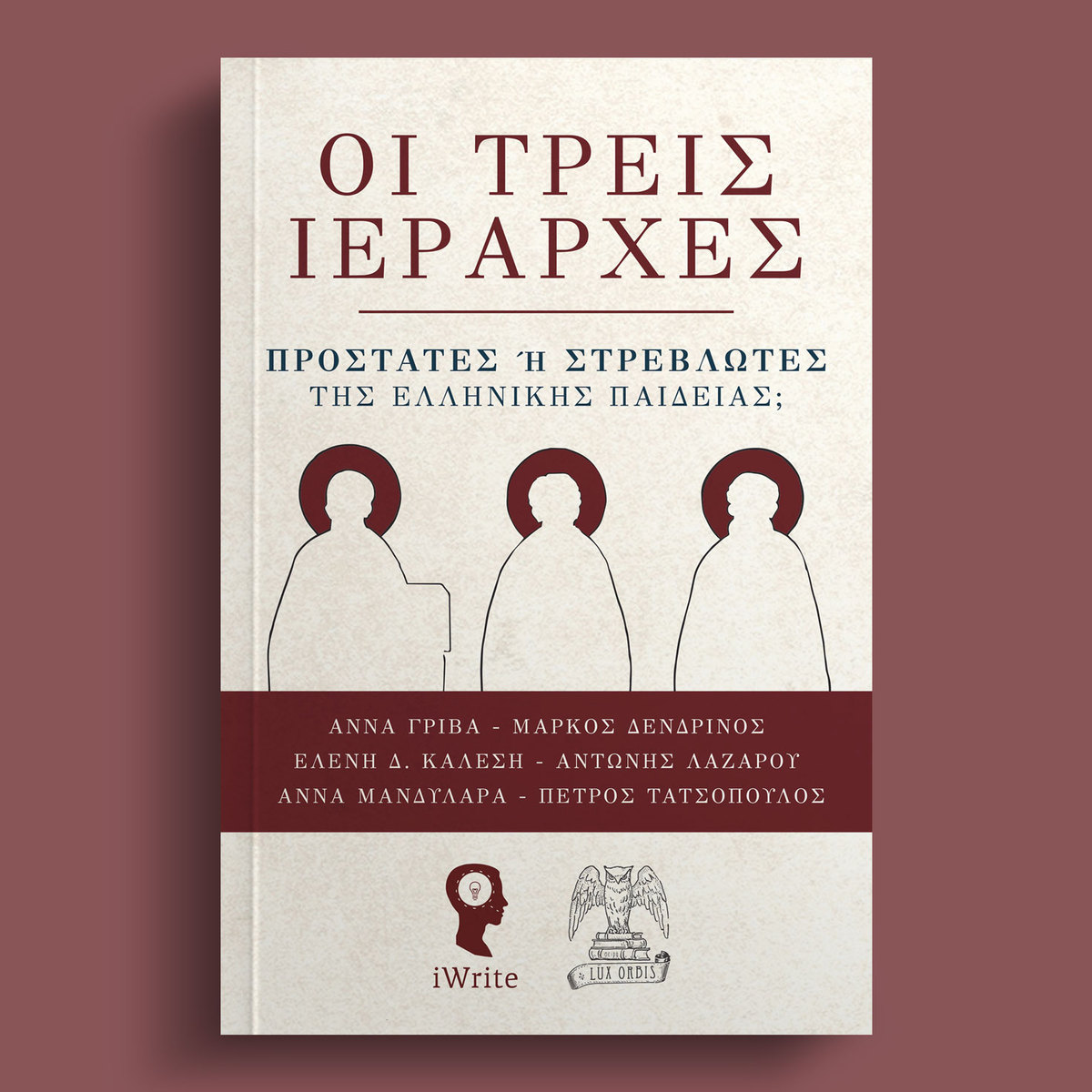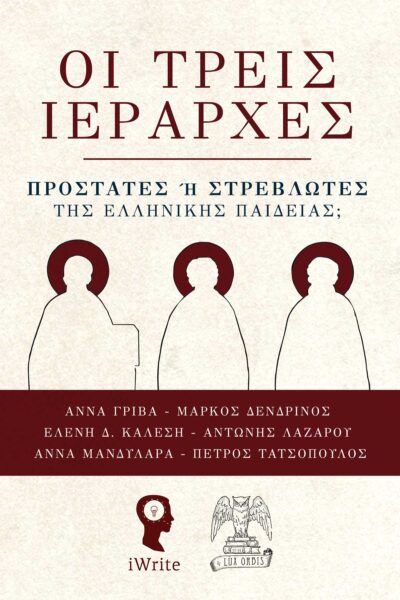«Tίποτα δεν δικαιούται να τίθεται υπεράνω ιστορικής επανεκτίμησης και αναθεώρησης, εάν οι προτεραιότητες εθνικής επιβίωσης, συμβατής με τους καιρούς, ενδεχομένως το επιβάλλουν. Η εθνική ταυτότητα δεν μπορεί να είναι απολιθωματικού χαρακτήρα. Αποτελεί ανασύνθεση υπό συνεχή αναθεώρηση και επανεκτίμηση, προκειμένου να αναδεικνύεται λειτουργική και αναδημιουργική».
Παναγιώτης Γεννηματάς (1949-2022)

Τρεις Ιεράρχες
Οι Τρεις Ιεράρχες & η ιδεολογική κατεύθυνση της εποχής
Η πολυσέλιδη έρευνα της Ελένης Καλέση1 ανέδειξε μια σειρά από σημαντικά προβλήματα που αποπειράται (;) να λύσει το υπουργείο Παιδείας (και Θρησκευμάτων) της χώρας μας τα τελευταία σαράντα χρόνια, με απώτερο σκοπό την ενίσχυση της κοσμικότητας σε μαθήματα όπως τα Θρησκευτικά και η Ιστορία, έτσι ώστε η Ελλάδα να εναρμονιστεί με τα αντίστοιχα ευρωπαϊκά πρότυπα. Για να αξιολογήσει κανείς το επίπεδο της Παιδείας ενός λαού, οφείλει να αναζητήσει τα πρότυπά του.
Και για να επιτευχθεί κάτι τέτοιο, πρέπει να επικεντρώσει το ενδιαφέρον του στα μέσα του 19ου αιώνα, περίοδο κατά την οποία τρεις πατέρες της Εκκλησίας που έζησαν κατά τους πρώτους μεταχριστιανικούς αιώνες, οι ονομαζόμενοι Τρεις Ιεράρχες, ξεκίνησαν να προωθούνται ως προστάτες της ελληνικής Παιδείας.
Κάτω από ποιες συνθήκες συνέβη κάτι τέτοιο; Ποιοι και γιατί έδωσαν μία τέτοια ιδεολογική κατεύθυνση, πάντα σε σχέση με τα κοινωνικά και πολιτικά δρώμενα της εποχής;
Στα ζητήματα αυτά απαντά, μέσω της εργασίας της, στις επόμενες σελίδες η Άννα Μανδυλαρά, επίκουρη καθηγήτρια Νεότερης Ελληνικής Ιστορίας στο πανεπιστήμιο Ιωαννίνων, εκ των κορυφαίων σύγχρονων ακαδημαϊκών στο πεδίο της μελέτης για τον 19ο αιώνα στον ελλαδικό και ελληνόφωνο χώρο.
Παρ’ όλα αυτά, η σχετική έρευνα απαιτεί ακόμα μεγαλύτερη εμβάθυνση. Έτσι, η πραγματοποίηση ενός νέου ταξιδιού στον χρόνο κρίνεται εξίσου επιτακτική. Ενός ταξιδιού που, αυτή τη φορά, θα έχει να κάνει με τη διερεύνηση και ανάλυση των φιλοσοφικών θέσεων των τριών προαναφερθέντων λογίων. Ποια η σχέση του Ιωάννη Χρυσοστόμου, του Γρηγόριου Ναζιανζηνού και του Μεγάλου Βασιλείου με την έννοια της ελληνικότητας; Συνάδει το παιδαγωγικό τους όραμα με τις σύγχρονες εκπαιδευτικές μεθόδους και αντιλήψεις; Ανιχνεύονται, άραγε, απόψεις τους που θα έφερναν σε μία ενοχλητική… αμηχανία τον μέσο Έλληνα του 21ου αιώνα;
Ο Μάρκος Δενδρινός, καθηγητής Πληροφορικής και Ιστορίας & Φιλοσοφίας της Επιστήμης στο Πανεπιστήμιο Δυτικής Αττικής, η Άννα Γρίβα, Δρ. του Τμήματος Ιταλικής Γλώσσας και Φιλολογίας στο ΕΚΠΑ, και ο Αντώνης Λαζάρου, ιστορικός ερευνητής, ξεκαθαρίζουν το τοπίο, προσφέροντας μία κρυστάλλινη εικόνα για τον φιλίστωρα αναγνώστη.
Επιστροφή στο παρόν
Και τέλος, ένας τρίτος και απαραίτητος σταθμός, με την επιστροφή μας στο παρόν. Πώς ακριβώς αντιμετωπίζει το σύγχρονο ελληνικό κράτος τους εορτασμούς για τους Τρεις Ιεράρχες; Ποια η σημειολογία των τιμών απέναντι στα τρία αυτά πρόσωπα στις μέρες μας και ποιες οι νομοθετικές αλλαγές στις οποίες προχωρούν οι ελληνικές κυβερνήσεις κατά τα τελευταία χρόνια; Σε αυτή την περίπτωση, κρίθηκε απαραίτητη η καίρια συμβολή της εκπαιδευτικού Δρ. Ελένης Καλέση, μέσω των αναλυτικών στοιχείων και πηγών που παρουσιάζει στο δικό της κείμενο.
Τις πέντε προαναφερθείσες εργασίες ντύνει υπό μορφή επιμέτρου ο δημοφιλής συγγραφέας Πέτρος Τατσόπουλος, ένας ένθερμος φίλος της Σειράς Lux Orbis, που σε κάθε ευκαιρία, δίχως φόβο και πάθος, καταθέτει δημοσίως τις θέσεις του για την ανάγκη ενός νέου Διαφωτισμού στην πατρίδα μας, στεκόμενος γενναία απέναντι στο τέρας της αμάθειας και του σκοταδισμού.
Η αντιπαράθεση με την Εκκλησία
Είναι γεγονός πως το κεφάλαιο «Τρεις Ιεράρχες» αποτελεί κατά τις τελευταίες δεκαετίες ένα έντονο σημείο κοινωνικής αντιπαράθεσης. Σε όσες και όσους ασχολούνται με το πεδίο της διαχρονικής σύγκρουσης ελληνισμού και χριστιανισμού, της διαμόρφωσης της νέας ελληνικής ταυτότητας ή ζητημάτων που αφορούν τις σχέσεις Κράτους και Εκκλησίας στη χώρα μας, είναι μάλλον γνωστές οι ετήσιες διαδικτυακές αναρτήσεις (κυρίως όσο πλησιάζουμε προς τα τέλη του Ιανουαρίου) με παραθέσεις συγκεκριμένων ρήσεων των τριών Πατέρων της Εκκλησίας, που φαίνεται να στρέφουν τα βέλη τους κατά του ελληνισμού. Συνήθως, όσοι διαμορφώνουν μια διαφορετική άποψη κάνουν λόγο για αποσπασματική χρήση των χωρίων αυτών, με σκοπό να προκύψει ένα επιθυμητό αποτέλεσμα.
Μία ομάδα έξι εξειδικευμένων επιστημόνων και μελετητών αναλύουν εις βάθος τα ιστορικά δεδομένα, παραδίδοντας εντέλει στο αναγνωστικό κοινό ένα εκδοτικό αποτέλεσμα μέσω του οποίου προκύπτουν χρήσιμα και απτά συμπεράσματα για τις καταβολές και τις πηγές έμπνευσης της σύγχρονης ελληνικής Παιδείας.
Σε ενδιαφέρει το ζήτημα της Θρησκείας εναντίον Παιδείας στην Ελλάδα
Βρες όλα τα βιβλία της Lux Orbis


